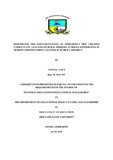Please use this identifier to cite or link to this item:
https://cris.library.msu.ac.zw//handle/11408/3737| Title: | Resourcing the implementation of Zimbabwe’s new updated curriculum: analysis of rural primary schools experiences in Murewa Nheweyembwa cluster in Murewa district | Authors: | Gift, Chinaka | Keywords: | Rural primary schools experiences Zimbabwe |
Issue Date: | 2019 | Publisher: | Midlands State University | Abstract: | The main purpose of this study was to analyse rural primary schools experiences in resourcing the implementation of the Zimbabwe 2017 updated primary school curriculum in Nheweyembwa Cluster in Murewa North district in Mashonaland East province. The objectives of this study were: To determine factors that are affecting the implementation of the updated primary school curriculum in rural primary schools; to establish the extent to which school mobilisation strategies are addressing resource inadequacy in schools; to determine resource mobilisation efforts for the implementation of the new curriculum; and explore schools mobilisation efforts for the implementation of the updated curriculum. In navigating this study, the researcher adopted the system model as the theoretical framework because of the fact that resources needed for curriculum implementation are inputs, management functions are processes and learner achievements and competences achieved are outputs of the system. The study targeted 7 primary schools in Nheweyembwa Cluster in Murewa District. The study was underpinned by the interpretive paradigm based on participants’ experiences. In navigating this study, a mixed method approach and a case study design were employed. The questionnaires were administered to all Heads of primary schools in the Cluster and forty-one (41) teachers who were currently teaching from ECD level up to Grade 5 level. Piloting of the questionnaires was conducted before the actual data collection to determine the validity and reliability of the research instruments. Research permit was obtained from the Ministry of Primary and Secondary Education Mashonaland East Provincial office and Murewa District offices. The data collected were processed and analysed using descriptive statistics. Major findings of the study are that most school have a critical shortage of material resources; teachers lack skills needed in the implementation of the Competence Based Curriculum The study recommends that school should be adequately be supported with material resources as well as human resources for effective implementation of the Competence Based Curriculum. Government to fund professional development of teachers so as to promote professional competence by offering training support services to teachers and school heads on resource mobilisation strategies and to ensure equitable distribution of resources to schools for curriculum implementation; further research be carried out in urban primary schools to identify challenges and opportunities that have so far been experienced in the implementation of the Competence Based Curriculum. | URI: | http://hdl.handle.net/11408/3737 |
| Appears in Collections: | Bachelor Of Education Honours Degree In History |
Files in This Item:
| File | Description | Size | Format | |
|---|---|---|---|---|
| dessertation print for executive.pdf | Full Text | 1.43 MB | Adobe PDF |  View/Open |
Page view(s)
278
checked on Feb 9, 2026
Download(s)
642
checked on Feb 9, 2026
Google ScholarTM
Check
Items in MSUIR are protected by copyright, with all rights reserved, unless otherwise indicated.



